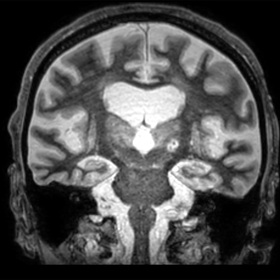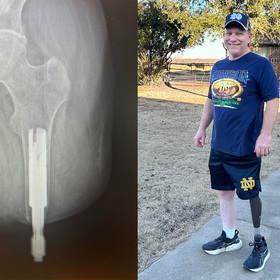2025 Article Archive
UTSW researchers use focused ultrasound to identify stroke biomarkers
A molecule called glial fibrillary acidic protein (GFAP) rose significantly in the blood of patients who underwent high-intensity focused ultrasound (HIFU), a procedure that is used to treat tremors and causes damage similar to a small stroke, UT Southwestern Medical Center scientists discovered in a new study. Their findings, published in Brain Communications, reveal a potential biomarker for stroke and could eventually lead to blood tests that quickly diagnose brain injuries.
Video helps defibrillator patients make informed choices
A UT Southwestern Medical Center quality improvement team led a large-scale, multispecialty project in partnership with the Parkland Center of Innovation and Value to help patients with implantable cardioverter defibrillators (ICDs) better understand their devices and make choices about their care.
New target to thwart multidrug resistance in cancer treatment
Multidrug resistance in cancer can be overcome by combining a drug that blocks a key enzyme with another anticancer drug, according to a study in preclinical models led by researchers at UT Southwestern Medical Center. The findings, published in Science Advances, could have implications for patients with certain cancers that have KRAS-G12C mutations after resistance to drug therapy develops.
Researchers make molecular connection between blindness, dementia
Researchers at UT Southwestern Medical Center have linked blindness in animal models to a brain-wide cellular stress response that’s a common risk factor for dementia. Their findings, published in Nature Communications, could help explain the connection between vision or hearing loss and dementia.
AI chatbots are mostly correct, but incomplete, on endometriosis
Three of the leading chatbots can provide basic information about endometriosis, a painful gynecologic condition that affects as many as 1 in 10 women, but their responses are not as comprehensive as the guidance from health care providers, according to a study by UT Southwestern Medical Center researchers.
Children’s Research Institute at UT Southwestern scientists identify feature of aggressive non-small cell lung cancer
In localized non-small cell lung cancer (NSCLC), a tumor’s ability to use carbon from glucose to feed the tricarboxylic acid (TCA) cycle predicts cancer spread beyond the lung, months to years before metastases are clinically apparent. According to this new research from Children’s Medical Center Research Institute at UT Southwestern (CRI) published in Cancer Discovery, tumors with this metabolic activity result in early patient death.
At UTSW, an innovative procedure offers new hope for amputees
Complications after an amputation left Scott Bryson, a 50-year-old father of three, unable to walk. But in June 2023, he took his first steps in nearly a decade after receiving a revolutionary surgical procedure at UT Southwestern Medical Center.
Samuel Achilefu, Ph.D., elected to National Academy of Engineering
Samuel Achilefu, Ph.D., inaugural Chair of Biomedical Engineering at UT Southwestern Medical Center and an internationally recognized leader in the fields of molecular imaging of cancer and nanotherapeutics, has been elected to the National Academy of Engineering (NAE).
Antibody designed to fight immunotherapy-resistant cancers
An investigational therapy significantly shrank lung cancer tumors that are notoriously resistant to treatment by encouraging an attack from natural killer (NK) cells in an animal model, a study led by UT Southwestern Medical Center researchers shows.
Popular diabetes/weight-loss drugs show additional benefit
A well-known class of drugs used to manage Type 2 diabetes and control weight could offer hope for patients who also struggle with related chronic kidney disease (CKD), researchers at UT Southwestern Medical Center found.










